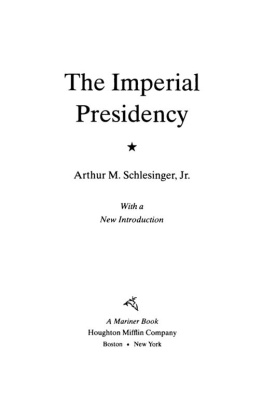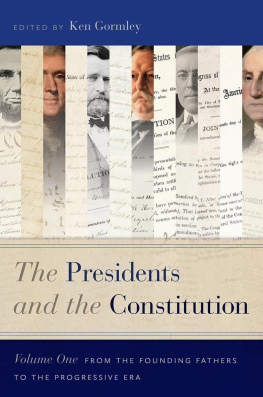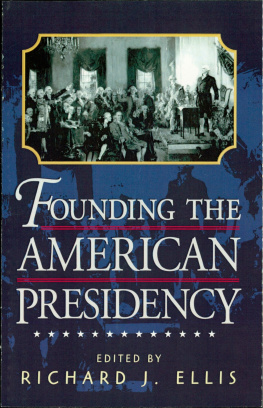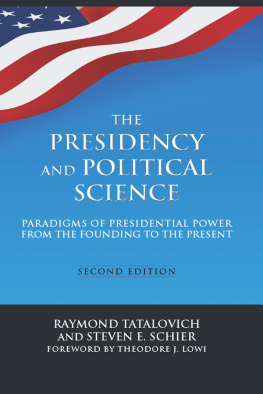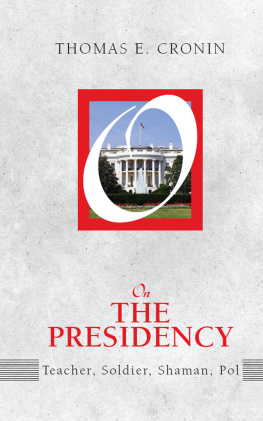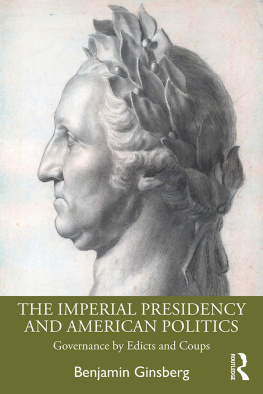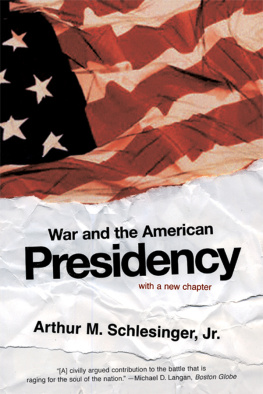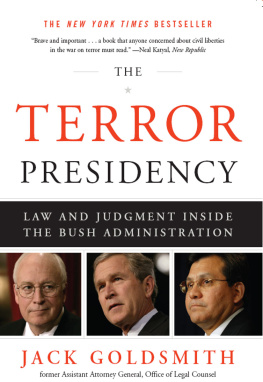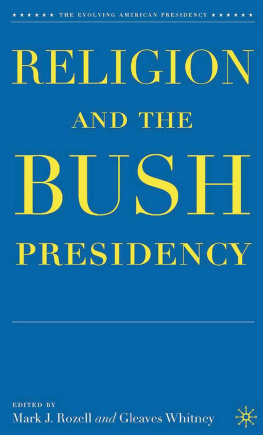First Mariner Books edition 2004
Copyright 1973 by Arthur M. Schlesinger, Jr.
Epilogue copyright 1989 by Arthur M. Schlesinger, Jr.
Introduction copyright 2004 by Arthur M. Schlesinger, Jr.
ALL RIGHTS RESERVED
For information about permission to reproduce selections from this book, write to Permissions, Houghton Mifflin Company, 215 Park Avenue South, New York, New York 10003.
Visit our Web site: www.houghtonmifflinbooks.com.
Library of Congress Cataloging-in-Publication Data
Schlesinger, Arthur Meier, date.
The imperial presidency / Arthur M. Schlesinger, Jr.; with a new introduction by the author.
p. cm.
Bibliography: p.
Includes index.
ISBN 0-618-42001-0 (pbk.)
1. PresidentsUnited StatesHistory. 2. Executive powerUnited StatesHistory. I. Title.
JK 511. S 35 1989 89-35462
353.03'13'09dc20 CIP
PRINTED IN THE UNITED STATES OF AMERICA
QUM 10 9 8 7 6
A portion of this book appeared in the Atlantic, copyright 1973 by The Atlantic Monthly Company. The epilogue appeared in dif ferent form in The Cycles of American History, copyright 1986 by Arthur M. Schlesinger, Jr.
For
Alexandra
Acknowledgments
I AM INDEBTED to the kindly and searching counsel of a number of friends who read parts of this workBenjamin V. Cohen, Joseph L. Rauh, Jr., Abraham Sofaer, Herman Kahn, and Herbert Wechslerand I particularly absolve the lawyers in this group from responsibility for the legal and constitutional solecisms that unquestionably linger in the text. I am indebted too for many courtesies to the library staffs of the Graduate School of the City University of New York, of the Council on Foreign Relations, and of the Association of the Bar of the City of New York. I could not possibly have completed this book without the unfailingly cheerful and resourceful assistance of Gretchen Stewart, and I am endlessly grateful to her, as well as to Mary Chiffriller and Bonnie Lurer, for the long and exacting hours they spent over their typewriters. Without the patient labor of Bernice Colt there would be no index. My debt to Alexandra Emmet Schlesinger is immeasurable and inexpressible.
Arthur M. Schlesinger, Jr.
Introduction to the Mariner Edition
Back to the Imperial Presidency
A FEW YEARS BACK, the Imperial Presidency seemed to be finished. President Bill Clinton was on the ropes, facing a special prosecutor and impeachment. The presidency appeared a stricken institution in grave troubleor so presidential scholars imagined.
In August 1998 I wrote an op-ed piece for the New York Times entitled So Much for the Imperial Presidency. The presidency, I wrote, was harried and enfeebled by an obsessed special prosecutor. Fellow presidential scholars shared in obituaries for the Imperial Presidency. The U.S. presidency, wrote Richard E. Neustadt, has been progressively weakened over the past three decades to the point where it is probably weaker today than at almost any time in the preceding century. Michael Beschloss chose The End of the Imperial Presidency as the title of his column portraying George W. Bush as the first truly post-imperial president.
Alas, the obituaries were premature. I had written The Imperial Presidency in the latter days of Richard M. Nixon. The American Constitution, the book argues, envisages a strong presidency within an equally strong system of accountability. When the constitutional balance is upset in favor of presidential power and at the expense of presidential accountability, the presidency can be said to become imperial.
The perennial threat to the constitutional balance, I suggested, arises in the field of foreign affairs. Confronted by presidential initiatives in domestic policy, the countervailing branches of the national governmentthe legislative and the judiciaryhave ample confidence in their own information and judgment. In this area they do not hesitate to challenge what they deem to be executive pretensions, nor do they lightly surrender power to the presidency. The media and public opinion, those extraconstitutional checks on the abuse of executive power, are similarly assured in dealing with domestic policy.
But confronted by presidential initiatives in foreign affairs, Congress and the courts, along with the press and the citizenry, often lack confidence in their own information and judgment and are likely to be intimidated by executive authority. The inclination in foreign policy is to let the president have the responsibility and the powera renunciation that results from congressional pusillanimity as well as from presidential rapacity. The more acute the crisis, the more power flows to the president.
It is chiefly in its foreign relations, Alexis de Tocqueville noted early on, that the executive power of a nation finds occasion to exert its skill and its strength. If the existence of the American Union were perpetually threatened, if its chief interests were in daily connection with those of other powerful nations, the executive would assume an increased importance. But the young republic Tocqueville visited in the 1830s had lived, at least since the War of 1812, in happy isolation from world power struggles. So, the President of the United States, Tocqueville observed, possesses almost royal prerogatives which he has no opportunity of exercising.
By the twentieth century the United States itself had become a world power, its interests in daily connection with those of other powers; and the half century from Pearl Harbor to the breakup of the Soviet Union was experienced as a time of perpetual threat to the American Union. The chronic international crisis known as the Cold War at last gave presidents the opportunity for sustained exercise of those almost royal prerogatives. What began as emergency powers temporarily confided to presidents soon hardened into authority claimed by presidents as constitutionally inherent in the presidential office: thus the Imperial Presidency.
The rise of the Imperial Presidency ran against the original intent of the constitutional framers. With the war-making propensities of absolute monarchs in mind, the framers of the Constitution took care to assign the vital foreign policy powers exclusively to Congress. Article I gave Congress not only the appropriations poweritself a potent instrument of controlbut also the power to declare war, to raise and support armies, to provide and maintain a navy, to regulate commerce, and to grant letters of marque and reprisal. This last provision represented the eighteenth-century equivalent of retaliatory strikes and empowered Congress to authorize limited as well as general war.
Even Alexander Hamilton, the Constitutional Conventions foremost proponent of executive energy, endorsed this allocation of powers. The history of human conduct, he wrote in Federalist 75, does not warrant that exalted opinion of human virtue which would make it wise to commit interests of so delicate and momentous a kind, as those which concern its intercourse with the rest of the world, to the sole disposal of ... a President of the United States. What seemed at stake was not only the wisdom of the policy but also the freedom of the people. Perhaps it is a universal truth, said James Madison, that the loss of liberty at home is to be charged to provisions against danger, real or pretended. from abroad.
The specific grants of authority to the executive in foreign policy were trivial compared with the authority specifically granted to Congress. The presidency was given the power of receiving and appointing ambassadors and, by implication, of serving as the channel of communications to foreign states. The president as commander in chief was given the power to direct the armed forces once war was authorized or begun and, by implication, the power to repel sudden attacks when Congress was not in session. However, Article II vested general executive power in the presidency. And, as Federalist 64 and 75 emphasized, the structural advantages of the presidencyunity, decision, secrecy, dispatch, stability of purpose, special sources of informationmade the executive the prime agent in dealings with foreign states.
Next page
